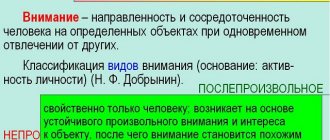Article:
Parents often notice that their child cannot concentrate on one thing for a long time. It manifests itself as forgetfulness and increased physical activity. Typically, this behavior is typical for preschoolers and schoolchildren and does not pose any threat. But sometimes these symptoms indicate dissipated attention syndrome in children (MSD), which must be treated promptly. Otherwise, in the future, signs of the syndrome may affect the learning process and many aspects of a person’s life.
Common signs of SAD in children
The syndrome is accompanied by impaired mental activity. The student lacks concentration and cannot do one thing for a long time. Disturbances in social activity begin to appear: he may be withdrawn and thoughtful or, conversely, overly active.
Out of one hundred children, fifteen typically suffer from attention deficit disorder, which manifests itself in a variety of ways. The first signs of deviation can be detected between the ages of four and nine years, but can occur earlier. For example, a one-year-old baby may be overly active, but at the same time his concentration is impaired. At the age of three years, speech problems may appear.
It is worth remembering that manifestations of attention deficit may be different. There are the following types of violation:
- Only lack of attention;
- Impaired attention and impulsivity (mood often changes, can be irritable and aggressive);
- Attention deficit and hyperactivity (restlessness, constantly distracted by something);
- The mixed variety is the most difficult. Behavior is unpredictable, intellectual function is impaired.
Psychologists identify three types of inattention
"Fluttering" attention
This is a weak concentration of attention, which is characterized by slight involuntary switching. Such inattention is typical, for example, of preschoolers. It occurs when tired, after a sleepless night, during a headache or during monotonous monotonous work. A type of such absent-mindedness is road hypnosis, when a person falls into a state of half-asleep that occurs during a long trip on a calm road.
"Professor's" absent-mindedness
With the second type of inattention, there is a high concentration of attention with difficulty switching, which is characteristic, for example, of scientists focused on their thoughts - the so-called “professorial” absent-mindedness. Many great people were absent-minded because they were focused on their creativity.
For example, N. Zhukovsky, who is called the father of Russian aviation, once received guests in his own living room. A few hours later he got up, put on his hat and began to say goodbye, apologizing that he had stayed too long visiting and it was time to go home.
And the English mathematician and physicist Isaac Newton once decided to boil an egg and put a watch in the water instead. There were also such oddities: the astronomer Galileo did not recognize his wife in his marital bed, because he forgot that he was married. And the historian Mommsen, looking for his glasses, thanked the girl who gave them to him and asked her name. “Anna, your daughter, dad,” the girl answered.
The same type of inattention is found in people who are haunted by obsessive thoughts, or in people who are too absorbed in the implementation of an overvalued idea - a fixed idea.
Poor concentration
And the third type of inattention is a weak concentration of attention with even weaker switchability. It is typical for people who have reduced strength and mobility of nervous processes. Usually in this case they talk about senile absent-mindedness. In healthy people, these processes decrease when overworked.
It is curious that psychologists, studying absent-mindedness and forgetfulness, observed a group of people during an experiment and noticed that in men these properties “exacerbated” in the period from 8 to 10 o’clock in the morning, and in women from 10 to 12 o’clock. And regardless of gender, the peak of errors was observed from 4 to 6 pm and from 8 to 10 pm.
Causes of the syndrome
Before treating absentminded attention in children, you need to know what could trigger this illness. Unfortunately, scientists have not yet been able to establish the exact cause, but there are several hypotheses indicating that childhood illness may manifest itself due to the following factors:
- Hereditary predisposition. There is a gene responsible for behavior. Some of its features may cause manifestations of attention deficit.
- Trauma at birth. This may include brain damage, prolonged labor, asphyxia (oxygen starvation).
- Diseases of the expectant mother. If the mother was ill with something during pregnancy, this can lead to impaired fetal development, hypoxia and other negative consequences.
- Bad habits. During pregnancy, the mother could smoke, drink alcohol or use drugs.
- Rhesus conflict. It occurs if the mother’s Rh factor is negative and the baby’s is positive.
- Diseases of internal organs. In particular, the brain, kidneys, heart.
This syndrome is often associated with hyperactivity. And this is not without reason; with attention deficit, a person is too emotional, restless, and there is increased excitability. These signs also apply to hyperactive children.
What is “Memory”?
Memory is a complex structured mechanism that allows people to perceive the information around us, process the received data and store it.
Each of us has this function from birth and has the opportunity to train and develop it.
Unfortunately, the opposite effect is also possible under the influence of various factors that can negatively affect attention and memory.
Attention is a directed emphasis on an action or event. This process is a similar cognitive phenomenon as memory.
What happens inside the brain
According to biologists, memory is the result of the functioning of a web of neural connections in which central nervous system reactions occur. A person perceives and perceives the objects around him through receptors: hearing, vision, smell, touch, taste. All information is transformed into electronic impulses that are sent to our brain. This is the final point where all collected information is stored.
We are able to remember even the smallest nuances or insignificant events if they are supported by one of the receptors. Memory is also unique in that a person is able to add various details to memories: “experienced” emotions, conclusions, and so on. In essence, we do not remember the actual event, but a slightly modified personal impression.
Where is the information stored?
Currently, scientists do not have answers to the specific question “Where and how is information stored in the human brain?” Many theories and assumptions have been put forward, but none of them have been confirmed.
In scientific circles, there is an opinion that the information received is stored in neural circuits.
Symptoms of distracted attention
The set of symptoms of absent-minded attention in a child directly depends on his character, social living conditions, upbringing, age, and severity of the disorder. Therefore, you first need to be able to correctly recognize the first signs of the syndrome. They may be:
- Inability to concentrate for a long time both at home and at school;
- Restlessness and carelessness;
- He cannot understand the words spoken to him or simply does not listen;
- Lack of self-control;
- He finds it difficult to follow rules and instructions;
- Tendency to disorder, things are always scattered on the desk, toys are on the floor;
- When doing something, he is distracted by any little things;
- Absent-mindedness and frequent loss of one's belongings;
- Forgetfulness associated with impaired attention;
- Tendency to anxiety;
- Problems with communication (with children, adults, teachers);
- Impatience and obsession;
- Increased speech activity, and the child cannot listen to the interlocutor and interrupts him;
- Inability to learn, new information is not perceived in full, difficulty in writing;
- Cannot finish what he starts;
- Bad behavior, the child is noisy, constantly spinning and waving his arms.
It is very important to monitor your child and at the first symptom that appears, begin to pay more attention to him.
How to improve memory. Recommendations from the Neuroscience Center
If you observe alarming symptoms in yourself or in people close to you, indicating memory problems similar to those indicated above, then you need to go to an appointment with a neurologist, neuropsychologist or therapist and undergo a series of special diagnostic tests. If you want to immediately start fighting an undesirable phenomenon before receiving the doctors’ verdict, then take action - start training your memory.
Here are some exercises to improve memory:
- If possible, perform your usual tasks with your eyes closed, from memory;
- If you are a left-handed person, do everyday tasks with your right hand, if you are right-handed, then with your left. Try this rule, for example, writing, ironing clothes, drawing, etc. – You will soon feel a positive result;
- learn Braille, which is used by blind people when reading, or learn sign language - this is useful for memory and can be useful in life;
- type texts on the keyboard with both hands, using all fingers;
- do some handicrafts - start embroidering or knitting;
- learn foreign languages and speak them more;
- try to distinguish the denomination of coins blindly, feeling them with your hands.
In addition, expand your range of interests, read more, visit places and institutions you have not been to before, go to plays and performances, walk in parks, meet and communicate with people, make new friends.
Perform the recommended exercises, follow the listed rules, take care of your health, and your memory will not fail you until old age!
Features of the diagnosis of SRV
Distracted attention syndrome is a behavioral disorder, not a mental disorder, so establishing an accurate diagnosis can be problematic. Individual manifestations may arise due to improper upbringing or personal characteristics.
It is necessary to resort to subjective diagnostic methods, among them are:
- Special questionnaires. They must be filled out not only by the student, but also by parents and teachers.
- Observation. It is necessary to monitor behavior while staying somewhere and at home.
- Psychological examination. It is important to identify intellectual abilities and skill impairments.
- Identification of diseases. Perhaps early illnesses of the child or his mother could have caused the appearance of this disease.
You need to make sure that your child has absent-mindedness syndrome, because restlessness and activity are also common in many healthy children. There is no doubt about the presence of the disease in the following cases:
- Constant symptoms of the disorder not only at home, but also at school, while out and about.
- Parents discovered the first signs in preschool age, and they did not go away for six months.
- Attention disorder interferes with a child’s learning; he cannot adapt normally to a team.
Treatment methods
We'll tell you what to do if your child has distracted attention. There are several correction methods. First of all, you need to remember about an integrated approach: one thing is not enough; you may need both drug therapy and sessions with a psychologist.
Proper nutrition and adherence to a convenient training regimen play an important role. At this time, a lot depends on both parents. Not only the mother, but also the father should participate in the fate of the child. They must create a daily routine for their child and always find time for him. This is the only way to raise a completely healthy child.
Medication method
Medicines are not always prescribed, only if serious attention problems have been identified in the child, worsening his quality of life and preventing him from socially adapting to the team.
Under no circumstances should you prescribe medications for your child on your own, even if there are many laudatory reviews about them. The medicine should only be prescribed by the attending physician!
Taking some sedatives may be indicated to reduce children's nervous excitability. In childhood, potent drugs are contraindicated, therefore, along with sedatives, they may prescribe tablets aimed at improving brain activity, for example, Glycine (an alternative is Biotredin), or improving blood supply to the brain (Phenibut).
Schedule
If a child suffers from lack of attention syndrome, then a clear daily routine is indispensable. Parents must demand that their children comply with it. This is the only way to instill discipline, which is sometimes absent even in healthy children.
The daily routine should be compiled and printed, hanging in a place convenient for the child, for example, above a desk or bed. Be sure to leave a few hours of free time so that the child can do what interests him.
Here is an example of a daily routine, you can change it according to your preferences:
| Time | Action |
| 07:00 — 07:05 | The child wakes up |
| 07:05 — 07:20 | Exercise, hygiene |
| 07:20 — 07:35 | Breakfast |
| 07:35 — 08:00 | Getting ready for school |
| 08:00 — 08:30 | Road to school |
| 08:30 — 13:05 | Lessons |
| 13:05 — 13:30 | Way home |
| 13:30 — 13:40 | Changing clothes, hygiene |
| 13:40 — 14:00 | Dinner |
| 14:00 — 16:00 | Free time, sections |
| 16:00 — 18:00 | Doing homework |
| 18:00 — 18:30 | Dinner |
| 18:30 — 20:00 | Free time |
| 20:00 — 21:00 | Preparation for sleep |
| 21:00 — 07:00 | Night sleep |
If poor attention and excessive activity interfere with studying in a regular school and communicating normally with his peers, then it may make sense to transfer him to an institution where he is taught according to an adapted program, or switch to home schooling. To make such a decision, you need to consult with different specialists to hear several opinions.
Classes with a psychologist
This stage should not be neglected - it is mandatory. A psychologist will help you get rid of excessive emotionality and impulsiveness. The child will become calmer, behave better, be able to adapt better in a given situation, and will try to concentrate in classes.
Usually classes with children are carried out in a playful way. The psychologist models certain situations and closely monitors the child’s behavior. If necessary, gives advice on what to do in a specific situation.
Psychologists also use a variety of relaxing techniques that will help the child get rid of accumulated tension. Therefore, psychological training is very important for attention disorders.
Parental control
Parents should take an active part in the treatment process. A child with an attention disorder requires special upbringing, and first of all, you need to give your child more independence.
The baby must perform certain household duties. Of course, they don’t have to be very complicated; they are selected depending on the age and physical fitness of the child. You need to give him tasks that he can handle, for example, washing dishes, dusting, or putting away toys.
At first, the child may not succeed in everything; you should not actively help him. He must learn to be persistent when trying to complete tasks on his own. Don’t forget about rewards; you need to praise your child for successfully completing a particular task.
You can resort to sports by sending your child to some section or working out with him yourself. Sport helps to waste excess energy for health benefits, and also teaches self-organization and discipline.
How a neurologist treats memory
Before starting treatment, it is necessary to understand what disease caused the problem. Medicines should be used only those prescribed by your attending physician; self-medication is unacceptable. It is optimal to undergo a complete diagnosis of brain activity, vascular health, and electroneuromyography.
It should be remembered that rapid memory deterioration in itself is not a disease; this symptom only warns of the emergence of a more serious disease that needs to be diagnosed and therapeutic or radical treatment begun. This will help restore the previous quality of life, prevent the patient from separating from society and deteriorating adaptive functions. When memory impairment is detected, nootropic drugs are usually prescribed.
Preventing problems during pregnancy
You need to start thinking about your child’s health even before conception. The expectant mother should give up bad habits if she has them and carefully monitor her health. Complicated pregnancy or difficult childbirth are often the cause of the development of the syndrome. After childbirth, you need to protect your baby from infectious diseases, possible injuries and other negative influences.
Even infants need developmental activities. You can show your baby bright objects and talk about their purpose. Of course, the baby will not understand what is said, but he will concentrate on the bright colors and familiar voice. A little later, age-appropriate educational toys should be used.
Many parents struggle with attention disorder. This problem is especially relevant for younger schoolchildren. Without qualified help, a child will not be able to concentrate on a particular activity for a long time, and will begin to experience problems in communication and learning. Therefore, it is very important to help him in a timely manner. You should start with a visit to a child psychologist.
Where can you improve your memory in St. Petersburg
Where should you go if it becomes clear that memory impairment is affecting your quality of life and you urgently need to take action? Why did my memory deteriorate? A specialist neurologist at our Center for Neurology, Professor Zhulev, can answer these questions.
Make an appointment with a doctor using the phone number listed on the website. If you notice that your ability to remember dates, faces and other data has sharply deteriorated, then you need to undergo an examination and identify the reasons. Don't let your health take its course. If memory has sharply deteriorated, then this is a signal from the body about problems that have arisen, and the sooner the doctor diagnoses them, the better.
We are located in the Central district of St. Petersburg, the work schedule and map can be found in the Contacts section.











